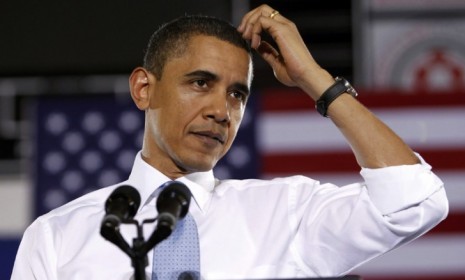Will employers drop health care coverage in 2014?
As America inches closer to the opening of federally-mandated insurance exchanges, executives at big companies are weighing their options

A free daily email with the biggest news stories of the day – and the best features from TheWeek.com
You are now subscribed
Your newsletter sign-up was successful
Employer-sponsored health insurance is a long-standing pillar of the U.S. health system, but its role appears likely to evolve soon. A new survey by Towers Watson, a consulting firm, finds that many mid-sized and large companies plan to stop offering coverage once federal insurance exchanges, a central element in President Obama's health care reform law, open in 2014. The exchanges are designed to provide a marketplace where people will be able to buy government-subsidized insurance. Here's what you need to know:
How many companies plan to stop offering health benefits?
Nearly 1 in 10 plan to drop coverage once their employees have the insurance exchange option, according to the July survey. And that number could rise, as another 20 percent say they still aren't sure what they'll do. Another big benefits consultant, Mercer, got similar feedback in June, when 8 percent of the employers it asked said they were either "likely" or "very likely" to end health benefits once the exchanges are up and running. Together, the surveys covered more than 1,200 companies.
The Week
Escape your echo chamber. Get the facts behind the news, plus analysis from multiple perspectives.

Sign up for The Week's Free Newsletters
From our morning news briefing to a weekly Good News Newsletter, get the best of The Week delivered directly to your inbox.
From our morning news briefing to a weekly Good News Newsletter, get the best of The Week delivered directly to your inbox.
What does this mean for employees?
That's not entirely clear yet. Most, of course, will see no changes, as the majority of companies say they'll continue offering health benefits. Some speculate that companies will boost workers' salaries to make up for the loss of benefits, which would permit employees to simply buy coverage on their own. But others fear employees will be unable to afford the coverage they once had. The Obama administration says such fears are overblown.
How much money could companies save by dropping coverage?
The average annual premium for employer-sponsored family health coverage was $13,770 per worker last year, and companies paid most of it, according to the Kaiser Family Foundation and Health Research and Educational Trust. Of course, if companies stop offering coverage, they can't just pocket that cash. Under the Affordable Care Act, businesses with more than 50 employees will face penalties of up to $3,000 per worker if they don't offer health benefits.
A free daily email with the biggest news stories of the day – and the best features from TheWeek.com
Is this the beginning of the end for employer-sponsored insurance?
Some experts do predict a dramatic domino effect. "If one employer does it, others likely will follow," said Paul Fronstin, director with the Employee Benefit Research Institute, as quoted by the Associated Press. But threatening to drop coverage and doing so are two different things, says former insurance executive Bob Laszewski. Companies might reconsider when they factor in the fines and tax headaches they'll incur, plus the extra pay they'll have to offer to prevent employees from walking out the door en masse. "Dropping coverage is going to be very difficult for these (companies) to do," says Laszewski.
Sources: Associated Press, Medical News Today, Journal-Sentinel
-
 Tourangelle-style pork with prunes recipe
Tourangelle-style pork with prunes recipeThe Week Recommends This traditional, rustic dish is a French classic
-
 The Epstein files: glimpses of a deeply disturbing world
The Epstein files: glimpses of a deeply disturbing worldIn the Spotlight Trove of released documents paint a picture of depravity and privilege in which men hold the cards, and women are powerless or peripheral
-
 Jeff Bezos: cutting the legs off The Washington Post
Jeff Bezos: cutting the legs off The Washington PostIn the Spotlight A stalwart of American journalism is a shadow of itself after swingeing cuts by its billionaire owner
-
 The billionaires’ wealth tax: a catastrophe for California?
The billionaires’ wealth tax: a catastrophe for California?Talking Point Peter Thiel and Larry Page preparing to change state residency
-
 Bari Weiss’ ‘60 Minutes’ scandal is about more than one report
Bari Weiss’ ‘60 Minutes’ scandal is about more than one reportIN THE SPOTLIGHT By blocking an approved segment on a controversial prison holding US deportees in El Salvador, the editor-in-chief of CBS News has become the main story
-
 Has Zohran Mamdani shown the Democrats how to win again?
Has Zohran Mamdani shown the Democrats how to win again?Today’s Big Question New York City mayoral election touted as victory for left-wing populists but moderate centrist wins elsewhere present more complex path for Democratic Party
-
 Millions turn out for anti-Trump ‘No Kings’ rallies
Millions turn out for anti-Trump ‘No Kings’ ralliesSpeed Read An estimated 7 million people participated, 2 million more than at the first ‘No Kings’ protest in June
-
 Ghislaine Maxwell: angling for a Trump pardon
Ghislaine Maxwell: angling for a Trump pardonTalking Point Convicted sex trafficker's testimony could shed new light on president's links to Jeffrey Epstein
-
 The last words and final moments of 40 presidents
The last words and final moments of 40 presidentsThe Explainer Some are eloquent quotes worthy of the holders of the highest office in the nation, and others... aren't
-
 The JFK files: the truth at last?
The JFK files: the truth at last?In The Spotlight More than 64,000 previously classified documents relating the 1963 assassination of John F. Kennedy have been released by the Trump administration
-
 'Seriously, not literally': how should the world take Donald Trump?
'Seriously, not literally': how should the world take Donald Trump?Today's big question White House rhetoric and reality look likely to become increasingly blurred